|
|
|
Sort Order |
|
|
|
Items / Page
|
|
|
|
|
|
|
| Srl | Item |
| 1 |
ID:
120536


|
|
|
|
|
| Publication |
2013.
|
| Summary/Abstract |
Brazilian foreign policy demonstrates an interesting double aspect in the changing global system. Its rhetoric and overt positioning is framed around the idea of Brazil as a value-creating actor, while in reality there are significant value-claiming characteristics at the core of its approach to regional and global affairs.
The key for Brazil is its position as a 'bridge' between the South and the North, which allows its diplomats to establish the country as a critical coalition organizer and ideational leader for southern actors looking for major changes in global governance systems, and a central interlocutor for northern actors trying to cope with pressure from the South. Brazil's ambitions are simple: focusing more on an improved relative position, rather than a complete reformulation of the international system, which serves it well in economic, political and security terms.
To explain this argument the article focuses on Brazilian engagement with Africa and South America, as well as the country's approach to major negotiations such as the WTO's Doha round, the Free Trade Area of the Americas and the evolution of regional governance mechanisms such as the Organization of American States and the recently created Community of Latin American and Caribbean States. The pattern that emerges is one of Brazil working to create a consensus around its position, using its consequent leadership to improve Brazilian leverage in the regional and global arena.
|
|
|
|
|
|
|
|
|
|
|
|
|
|
|
|
| 2 |
ID:
144129
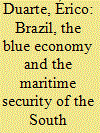

|
|
|
|
|
| Summary/Abstract |
This paper points out that the Brazilian emerging maritime approach is a remarkable change in its post-Cold War era's defence policy. The constraints of the US regional hegemony in the American continent resulted in a reactive defence policy throughout the twentieth century and its division from Brazilian foreign policy. Although the regional systemic conditions of powers remain in the twenty-first century, the ‘Atlantic energy renaissance’ promises to burst Brazilian social-economic development. Because the emerging Southern Atlantic Blue Economy is an event of global impact, Brazil is proactive to an expected growing contest for energy and resources in the region. That explains the institutional reforms in the Brazilian armed forces, the emphasis on coastal defence, the new agenda for West Africa, and the new push in the Zone for Peace and Cooperation of the South Atlantic. This offers a historical background of that change, assesses its main aspects and challenges, and concludes with some recommendations.
|
|
|
|
|
|
|
|
|
|
|
|
|
|
|
|
| 3 |
ID:
163125
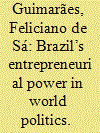

|
|
|
|
|
| Summary/Abstract |
In this paper, we apply the concept of entrepreneurial powers to analyze Brazil’s participation and influence in international crises. Following Ravenhill (this journal issue), we consider three dimensions of entrepreneurship: (a) the intention to convince others according to an actor’s interests; (b) the use of skilful politicians and bureaucracies to persuade partners; and (c) a proactive foreign policy that “sells” its position regarding the issues at stake. We argue that two other factors should be considered for a more encompassing view of entrepreneurial powers. First, the position of the involved great power on the crisis or in its negotiation. Second, that regional politics matter to entrepreneurial powers. We develop our argument using two case studies of success and failure respectively: the 1995 Cenepa War between Peru and Ecuador mediated by Brazil, and the 2010 Iranian nuclear deal sponsored by Brazil and Turkey.
|
|
|
|
|
|
|
|
|
|
|
|
|
|
|
|
| 4 |
ID:
114422
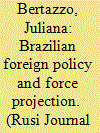

|
|
|
|
|
| Publication |
2012.
|
| Summary/Abstract |
A permanent seat on the UN Security Council is a long-term goal of Brazil's foreign policy. Political engagement in the international arena and a demonstrable contribution to international peace and security are part of the requirements Brazil needs to fulfil if this goal is to be attained. The South American power's increasing engagement in the Middle East in the post-Cold War era is to be understood as part of the Brazilian bid to strengthen its credentials as a global player, argues Juliana Bertazzo.
|
|
|
|
|
|
|
|
|
|
|
|
|
|
|
|
| 5 |
ID:
188676


|
|
|
|
|
| Summary/Abstract |
This paper engages with debates over the Liberal International Order (LIO) and Latin America by focusing on Brazil. More specifically, it addresses President Jair Bolsonaro’s foreign policy. His radical-right populist and religious-infused approach has been characterised by an explicit rejection of practically all elements of the LIO, including multilateralism, multiculturism, and regionalism—historically core features of Brazilian foreign policy. We seek to answer two interrelated questions: (1) what were the political conditions—domestic and international—that allowed for such dramatic foreign policy change? (2) what impact is Brazil’s new foreign policy orientation having on the LIO? To address them, we resort to the aspirational constructivist theory, which has allowed us to theorise Brazil’s new identity formation. We argue that Bolsonaro has reshaped Brazil’s foreign policy as part of his endeavour to create a national self-image based on three pillars: anti-globalism, anti-Communism, and religious nationalism. By doing so, the Bolsonaro administration has transformed Brazil, otherwise an avid supporter of the LIO, into one of the order’s most vocal critics. While anti-globalism (and, subsidiarily, anti-Communism) undermines the normative and institutional foundations of the LIO, religious nationalism offers a replacement to the order, based on independent ethno-nationalist communities. If Brazil’s radical right populist model spreads across Latin America, it has the potential to hollow out the region’s support to the LIO.
|
|
|
|
|
|
|
|
|
|
|
|
|
|
|
|
| 6 |
ID:
167880
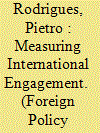

|
|
|
|
|
| Summary/Abstract |
The literature on Latin American foreign policy analysis has long called for more empirical and theoretical rigor. Because foreign policy making is a multifaceted concept, there are a wide array of outcomes that scholars use interchangeably to proxy it, thus leading to unclear results on its main determinants. Using Brazil as a case study, we offer a methodological tool that, we believe, can contribute to further closing this gap. We developed an index that quantifies the level of foreign policy engagement, taking into account the decisions made by different governmental actors for 192 country dyads along sixteen years. We confirm that Brazil managed to expand its international relations with both the Global South and Global North and that domestic variables that the Workers’ Party ideology played a major role in drove the shift toward giving preeminence to countries in the Global South. The results support the usefulness of our tool, which deepens our understanding of foreign policy making in Latin America, bringing new insights to the discussion.
|
|
|
|
|
|
|
|
|
|
|
|
|
|
|
|
| 7 |
ID:
153543
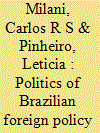

|
|
|
|
|
| Summary/Abstract |
Starting from the perspective that foreign policy is a public policy, this article discusses the conceptual and political implications of the new configuration of Brazilian foreign policy. Therefore, we abandon its automatic association with the cruder versions of realism and bring it to the field of politics, thus recognizing that its formulation and implementation fall into the dynamics of governmental choices which, in turn, stem from negotiations within coalitions, bargaining, disputes, and agreements between representatives of diverse interests. As a result, we remove foreign policy from a condition linked to inertial and supposedly self-evident and/or permanent national interests (which would be protected from injunctions of cyclical nature related to partisan politics) and undress it of features generally attributed to so-called state policies. Finally, we suggest ways for an innovative research agenda on the role of diplomatic agency, political institutions, and nonstate actors in Brazil’s foreign policy.
|
|
|
|
|
|
|
|
|
|
|
|
|
|
|
|
| 8 |
ID:
156234
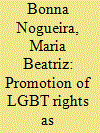

|
|
|
|
|
| Summary/Abstract |
One of the greatest contemporary challenges in human rights norm making is defining the protection against discrimination based on sexual orientation, gender identity, and gender expression as an international standard. In an unusually polarized structure, the approval of a few resolutions on the rights of lesbian, gay, bisexual, transvestite, transsexual, and transgender persons has engendered intense negotiation within international organizations, which has been largely promoted by Brazil. By expanding the analytical parameters of the literature on norm entrepreneurship to the study of foreign policy, the article analyzes Brazil's international leadership on LGBT rights, explaining the origins, motivations, and results of the country's proactive stance on the issue.
|
|
|
|
|
|
|
|
|
|
|
|
|
|
|
|
| 9 |
ID:
141733
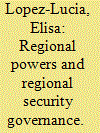

|
|
|
|
|
| Summary/Abstract |
The study of regional powers has become an increasingly prominent part of debates in the academic field of International Relations (IR), particularly regarding their role in creating the conditions for international security. While the IR literature tends to focus on the causal effect of material and ideational factors to explain the policy of regional powers, this article uses an interpretive approach, centring on the study of historical representations. Through a comparative analysis of the foreign policies of Brazil and Nigeria since the 1990s, it argues that a focus on the traditions and dilemmas of regional powers enables a better explanation of their policy, one which illustrates how material factors are refracted through the representations of foreign policy elites in the two countries and expressed in their foreign policy practices as regional powers.
|
|
|
|
|
|
|
|
|
|
|
|
|
|
|
|
| 10 |
ID:
178495
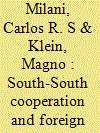

|
|
|
|
|
| Summary/Abstract |
Brazil’s government has historically engaged with other developing countries to promote technical cooperation. Since the 1988 federal Constitution, different presidents have paid attention to this foreign policy agenda. However, it was particularly under the Workers’ Party’s administrations (2003–2016) that South-South cooperation (SSC) gained political ground, rooted in official principles of South-South solidarity, horizontality, non-interference in domestic affairs, and the defence of a multipolar world-vision. In this article, based on the argument that international development cooperation (IDC) is a key instrument of a country’s economic diplomacy, we analyse the perceptions of Brazilian diplomats about SSC in order to understand Brazil’s interests and motivations in this field. Methodologically, the article discusses the main results of a survey conducted between 25 August and 23 September 2016 among 349 Brazilian individuals, who correspond to approximately 22 per cent of Brazil’s active diplomats. The survey results showed that Brazilian diplomats generally have a favourable perception on Brazil’s SSC programmes, and that a great majority of them has already acted in SSC activities. Still, the issue of political conditionality brings in cleavages, indicating that there is a large group of Brazilian diplomats who openly support SSC as an instrument of national interests and not because of the official narratives related to a ‘solidarity with the South’ or ‘the promotion of human rights’. As a consequence, with the exception of perceptions on political conditionalities and economic criteria, the majority of diplomats share commonalities that also correspond to the government’s official rhetoric between 2003 and 2016. This article is structured around the following three sections: (1) South-South cooperation as a foreign policy agenda, (2) Diplomats as agents of Brazil’s South-South cooperation and (3) Presenting and discussing the perceptions of Brazilian diplomats.
|
|
|
|
|
|
|
|
|
|
|
|
|
|
|
|
|
|
|
|
|